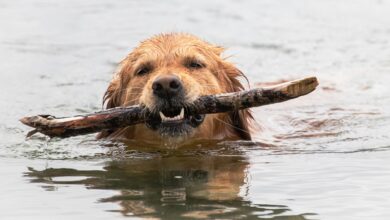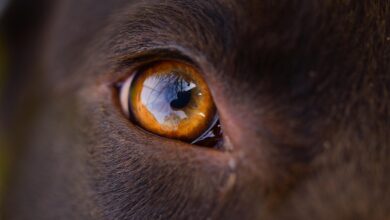The Importance of Rest for Working Labradors and Retrievers
Tired muscles and joints are more prone to injury if there is not enough rest

BY BERNADETTE ROBERTS
Labradors and retrievers that serve as working dogs often have demanding tasks, whether it’s assisting in hunting, search and rescue, or providing support for people with disabilities. These dogs are highly intelligent, energetic, and physically capable, making them well-suited for various forms of labour. However, just like any working animal or human, rest and recovery are essential to maintain their physical and mental well-being.
The importance of rest for a working Labrador or retriever cannot be overstated, as it is crucial for preventing injuries, sustaining optimal performance, and ensuring the dog remains healthy throughout their working life. Adequate rest allows the dog to recover from physical exertion, replenish energy reserves, and repair muscle tissue. It also contributes to their emotional and mental health, as working dogs are often exposed to stressful or high-intensity environments.
Why Rest Is Important
Working dogs, particularly Labradors and retrievers, perform physically demanding tasks that require stamina, focus, and strength. Whether it’s retrieving game during hunting, assisting their handler in a search, or working with individuals who rely on their service, these dogs are often engaged in activities that require intense focus and exertion. Without proper rest, they can face several negative consequences.
Extended periods of activity without adequate rest can lead to muscle fatigue, soreness, and the risk of overuse injuries. Overexertion can cause muscle strains, joint issues, and overall physical burnout, which may take longer to recover from if proper rest is not provided. Working dogs, especially those involved in tasks that require training or interaction with humans, can also experience mental fatigue. Dogs like Labradors and retrievers are highly intelligent and need mental stimulation as much as they need physical exercise. However, if they’re not allowed to rest, mental exhaustion can lead to reduced focus, confusion, and stress.
Additionally, continuous work can heighten a dog’s stress levels, particularly in high-pressure situations like search and rescue missions or assisting individuals with medical conditions. Rest periods allow dogs to unwind, reduce anxiety, and return to work with a calm and focused demeanour. Just like humans, dogs need time to recover from the stresses of physical activity. Overworked dogs may experience long-term health problems such as joint deterioration, arthritis, or chronic fatigue if proper rest is not prioritized.
How Long Should a Working Labrador or Retriever Rest?
The amount of rest required for a working dog largely depends on the intensity of their work, their age, and their overall health. Working dogs, like Labradors and retrievers, can typically handle strenuous activities, but their bodies still need time to recover. After a particularly active session, such as a long day of hunting or training, a Labrador or retriever should be allowed at least 1 to 2 hours of rest for every 30 minutes to 1 hour of intense activity. During this time, the dog should have access to fresh water, a comfortable and quiet place to relax, and an opportunity to lie down and rest their muscles.
If a dog is involved in repeated or daily tasks, it’s crucial to give them one to two full rest days per week to allow their body to recuperate. This is especially true for older dogs or those with any pre-existing health conditions. Rest days are important for reducing the risk of cumulative wear and tear on joints and muscles, which can result in long-term injuries.
A working dog should also have the opportunity to sleep for 12 to 14 hours a day, especially if they have had a particularly physically demanding period. Dogs, like humans, need quality sleep to process and recover from both physical and mental exertion. A quiet, safe sleeping area is essential to ensure that the dog can rest undisturbed. If the dog has suffered any injuries during their work, whether they are mild strains, cuts, or more serious physical trauma, rest times may need to be extended. It is important to follow a veterinarian’s advice when it comes to recovery after injuries, which may involve limiting physical activity for a period of time while the injury heals.
What Happens if a Working Labrador or Retriever Doesn’t Rest?
When a working Labrador or retriever is deprived of proper rest, they may begin to show signs of physical and emotional stress. If a dog is overworked, they may appear tired or reluctant to engage in work, showing less enthusiasm or energy during tasks. Dogs that don’t get enough rest can become irritable, anxious, or exhibit undesirable behaviours such as excessive barking, pacing, or destructive chewing. A tired dog is less focused and may not perform as well in their tasks. For retrievers or Labradors working in fields such as hunting or assisting humans, a lack of rest can reduce their efficiency and effectiveness.
Tired muscles and joints are more prone to injury, and overexertion can lead to more serious issues like muscle strains, ligament injuries, or joint problems. Rest is critical to prevent these injuries, ensuring that the dog stays in peak physical condition to carry out their important work.
Providing the Right Environment for Rest
In addition to giving your working Labrador or retriever the appropriate amount of rest time, it’s equally important to provide the right environment for them to relax and recover. A comfortable resting space is essential for their recovery. Provide a soft, quiet place for the dog to lie down and sleep, away from distractions, noise, or any other sources of stress. A bed with good support for their joints is recommended, especially as dogs age. After a session of work, ensure your dog has access to fresh water to rehydrate and high-quality food to replenish their energy. This is particularly important for maintaining good overall health and muscle recovery.
Gently massaging your dog’s muscles or performing stretches (as guided by a veterinarian or dog trainer) can help prevent stiffness and support recovery. This is particularly important for working dogs that may have experienced significant physical exertion. Mental rest is just as crucial as physical rest. Allowing the dog to rest in a calm and quiet environment without distractions or stressors helps the dog recover mentally, improving focus and alertness for future tasks.






